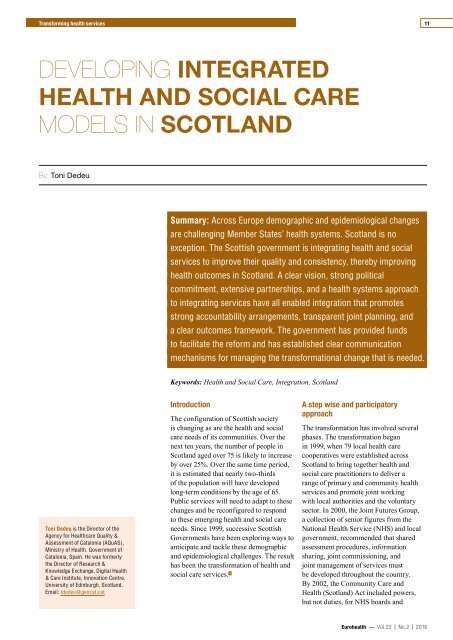EUROHEALTH
Eurohealth-volume22-number2-2016
Eurohealth-volume22-number2-2016
Create successful ePaper yourself
Turn your PDF publications into a flip-book with our unique Google optimized e-Paper software.
Transforming health services<br />
11<br />
DEVELOPING INTEGRATED<br />
HEALTH AND SOCIAL CARE<br />
MODELS IN SCOTLAND<br />
By: Toni Dedeu<br />
Summary: Across Europe demographic and epidemiological changes<br />
are challenging Member States’ health systems. Scotland is no<br />
exception. The Scottish government is integrating health and social<br />
services to improve their quality and consistency, thereby improving<br />
health outcomes in Scotland. A clear vision, strong political<br />
commitment, extensive partnerships, and a health systems approach<br />
to integrating services have all enabled integration that promotes<br />
strong accountability arrangements, transparent joint planning, and<br />
a clear outcomes framework. The government has provided funds<br />
to facilitate the reform and has established clear communication<br />
mechanisms for managing the transformational change that is needed.<br />
Keywords: Health and Social Care, Integration, Scotland<br />
Toni Dedeu is the Director of the<br />
Agency for Healthcare Quality &<br />
Assessment of Catalonia (AQuAS),<br />
Ministry of Health, Government of<br />
Catalonia, Spain. He was formerly<br />
the Director of Research &<br />
Knowledge Exchange, Digital Health<br />
& Care Institute, Innovation Centre,<br />
University of Edinburgh, Scotland.<br />
Email: tdedeu@gencat.cat<br />
Introduction<br />
The configuration of Scottish society<br />
is changing as are the health and social<br />
care needs of its communities. Over the<br />
next ten years, the number of people in<br />
Scotland aged over 75 is likely to increase<br />
by over 25%. Over the same time period,<br />
it is estimated that nearly two-thirds<br />
of the population will have developed<br />
long-term conditions by the age of 65.<br />
Public services will need to adapt to these<br />
changes and be reconfigured to respond<br />
to these emerging health and social care<br />
needs. Since 1999, successive Scottish<br />
Governments have been exploring ways to<br />
anticipate and tackle these demographic<br />
and epidemiological challenges. The result<br />
has been the transformation of health and<br />
social care services. 1<br />
A step wise and participatory<br />
approach<br />
The transformation has involved several<br />
phases. The transformation began<br />
in 1999, when 79 local health care<br />
cooperatives were established across<br />
Scotland to bring together health and<br />
social care practitioners to deliver a<br />
range of primary and community health<br />
services and promote joint working<br />
with local authorities and the voluntary<br />
sector. In 2000, the Joint Futures Group,<br />
a collection of senior figures from the<br />
National Health Service (NHS) and local<br />
government, recommended that shared<br />
assessment procedures, information<br />
sharing, joint commissioning, and<br />
joint management of services must<br />
be developed throughout the country.<br />
By 2002, the Community Care and<br />
Health (Scotland) Act included powers,<br />
but not duties, for NHS boards and<br />
Eurohealth — Vol.22 | No.2 | 2016
















